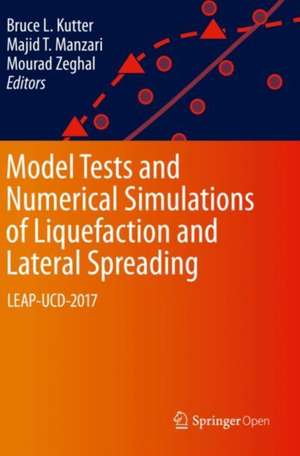Model Tests and Numerical Simulations of Liquefaction and Lateral Spreading: LEAP-UCD-2017
Editat de Bruce L. Kutter, Majid T. Manzari, Mourad Zeghalen Limba Engleză Paperback – 11 sep 2020
The work presented in this book was followed by LEAP-Asia that included assessment of a generalized scaling law and culminated in a workshop in Osaka, Japan in March 2019. LEAP-2020, ongoing at the time of printing, is addressing the validation of soil-structure interaction analyses of retaining walls involving a liquefiable soil. A workshop is planned at RPI, USA in 2020.
| Toate formatele și edițiile | Preț | Express |
|---|---|---|
| Paperback (1) | 408.09 lei 38-44 zile | |
| Springer International Publishing – 11 sep 2020 | 408.09 lei 38-44 zile | |
| Hardback (1) | 449.85 lei 3-5 săpt. | |
| Springer International Publishing – 16 noi 2019 | 449.85 lei 3-5 săpt. |
Preț: 408.09 lei
Nou
Puncte Express: 612
Preț estimativ în valută:
78.08€ • 81.54$ • 64.48£
78.08€ • 81.54$ • 64.48£
Carte tipărită la comandă
Livrare economică 11-17 aprilie
Preluare comenzi: 021 569.72.76
Specificații
ISBN-13: 9783030228200
ISBN-10: 3030228207
Pagini: 660
Ilustrații: XXI, 660 p. 494 illus., 397 illus. in color.
Dimensiuni: 155 x 235 mm
Ediția:1st ed. 2020
Editura: Springer International Publishing
Colecția Springer
Locul publicării:Cham, Switzerland
ISBN-10: 3030228207
Pagini: 660
Ilustrații: XXI, 660 p. 494 illus., 397 illus. in color.
Dimensiuni: 155 x 235 mm
Ediția:1st ed. 2020
Editura: Springer International Publishing
Colecția Springer
Locul publicării:Cham, Switzerland
Cuprins
Chapter1: LEAP-UCD-2017 V. 1.01 model specifications.- Chapter2: Grain Size Analysis and Maximum and Minimum Dry Density of Ottawa F-65 Sand for LEAP-UCD-2017.- Chapter3: Physical and Mechanical Properties of Ottawa F65 Sand.- Chapter4: LEAP-UCD-2017 comparison of centrifuge test results.- Chapter5: Archiving of experimental data for LEAP-UCD-2017.- Chapter6: Comparison of LEAP-UCD-2017 CPT results.- Chapter7: Difference and Sensitivity Analyses of the LEAP-2017 Experiments.- Chapter8: LEAP-2017 Simulation Exercise – Overview of Guidelines for the element test simulations.- Chapter9: Calibration of Constitutive Models and Simulation of the Element Tests.- Chapter10: LEAP-2017: Comparison of the Type-B Numerical Simulations with Centrifuge Test Results.- Chapter11: Numerical sensitivity study compared to trend of experiments for LEAP-UCD-2017.- Chapter12: LEAP-UCD-2017 Centrifuge Tests at Cambridge.- Chapter13: LEAP-UCD-2017 Centrifuge Test at University of California, Davis.- Chapter14: LEAP-2017 Centrifuge Test at Ehime University.- Chapter15: LEAP-UCD-2017 Centrifuge Test at IFSTTAR.- Chapter16: LEAP-UCD-2017 Centrifuge Test at KAIST.- Chapter17: LEAP-UCD-2017 Centrifuge Test at Kyoto University.- Chapter18: LEAP-UCD-2017 Centrifuge Tests at NCU.- Chapter19: Verification of the Repeatability of Soil Liquefaction Centrifuge Testing at Rensselaer.- Chapter20: Specifications and Results of Centrifuge Model Test at Zhejiang University for LEAP-UCD-2017.- Chapter21: Prediction of LEAP-UCD-2017 Centrifuge Test Results Using Two Advanced Plasticity Sand Models.- Chapter22: LEAP-UCD-2017 Centrifuge Test Simulation at UNINA.- Chapter23: LEAP-2017 Centrifuge Test Simulation using HiPER.- Chapter24: Numerical Simulations of Selected LEAP Centrifuge Experiments with PM4Sand in FLAC.- Chapter25: LEAP-UCD-2017 Numerical Simulation at Meisosha Corp.-Chapter26: Numerical Simulations of LEAP Dynamic Centrifuge Model Tests for Response of Liquefiable Sloping Ground.- Chapter27: LEAP-UCD-2017 Simulation Team Fugro.- Chapter28: LEAP-UCD-2017 Type-B Predictions through FLIP at Kyoto University.- Chapter29: LEAP-UCD-2017 Simulations at Tsinghua University.- Chapter30: Application of a SANISAND model for numerical simulations of the LEAP 2017 experiments.- Chapter31: Numerical Simulation Trial by Cocktail Glass Model in FLIP ROSE for LEAP-UCD.- Chapter32: Preliminary Seismic Deformation and Soil-Structure Interaction evaluationS of A caisson-supported Marine Terminal wharf retaining and founded on liquefiable soils.- Chapter33: Significance of calibration procedure consistency.- Chapter34: Paths forward for Evaluating Seismic Performance of Geotechnical structures.- Chapter35: Selected issues in the seismic evaluation of embankment dams for possible investigation by LEAP.- Chapter36: Soil permeability in centrifuge modeling.- Chapter37: Variation of permeability of viscous fluid during liuefaction model testing.- Chapter38: Post-liquefaction cyclic shear strain: phenomenon and mechanism.
Textul de pe ultima copertă
This open access book presents work collected through the Liquefaction Experiments and Analysis Projects (LEAP) in 2017. It addresses the repeatability, variability, and sensitivity of lateral spreading observed in twenty-four centrifuge model tests on mildly sloping liquefiable sand. The centrifuge tests were conducted at nine different centrifuge facilities around the world. For the first time, a sufficient number of experiments were conducted to enable assessment of variability of centrifuge test results. The experimental data provided a unique basis for assessing the capabilities of twelve different simulation platforms for numerical simulation of soil liquefaction. The results of the experiments and the numerical simulations are presented and discussed in papers submitted by the project participants.
The work presented in this book was followed by LEAP-Asia that included assessment of a generalized scaling law and culminated in a workshop in Osaka, Japan in March 2019. LEAP-2020, ongoing at the time of printing, is addressing the validation of soil-structure interaction analyses of retaining walls involving a liquefiable soil. A workshop is planned at RPI, USA in 2020.
The work presented in this book was followed by LEAP-Asia that included assessment of a generalized scaling law and culminated in a workshop in Osaka, Japan in March 2019. LEAP-2020, ongoing at the time of printing, is addressing the validation of soil-structure interaction analyses of retaining walls involving a liquefiable soil. A workshop is planned at RPI, USA in 2020.
